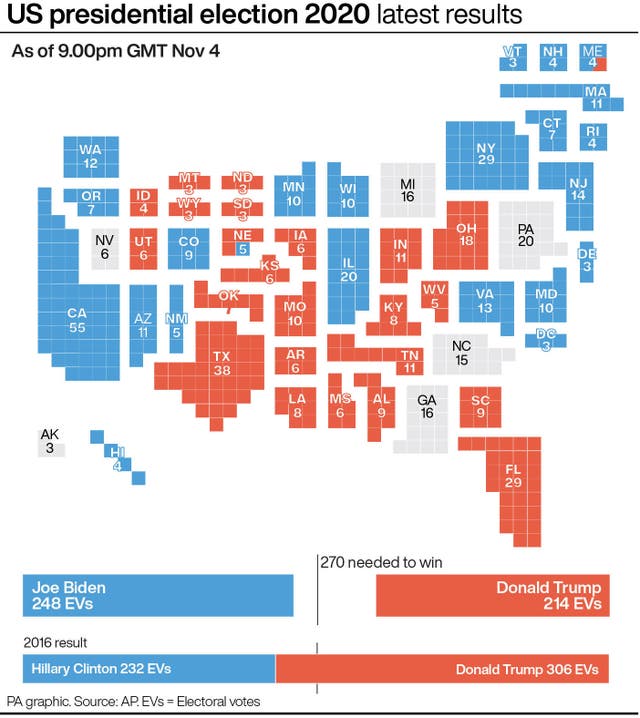Biden wins Wisconsin as US presidency still hangs in balance

Joe Biden won Wisconsin on Wednesday, reclaiming a key part of the “blue wall” that slipped away from Democrats four years ago and narrowing US President Donald Trump’s pathway to re-election.
A full day after election day, neither candidate had cleared the 270 electoral college votes needed to win the White House.
Margins remained tight in several fiercely contested states including the Great Lakes battlegrounds of Michigan and Pennsylvania.
But Mr Biden’s victory in Wisconsin loomed as an important step to the presidency.
He said that he now expected to win the White House, along with running mate Kamala Harris, though he stopped short of outright declaring victory.
“I will govern as an American president,” Mr Biden said. ”There will be no red states and blue states when we win. Just the United States of America.”
The Associated Press called Wisconsin for Mr Biden after election officials in the state said all outstanding ballots had been counted, save for a few hundred in one township and an expected small number of provisional votes.
Mr Trump’s campaign requested a recount.
Statewide recounts in Wisconsin have historically changed the vote tally by only a few hundred votes; Mr Biden led by 0.624 percentage point out of nearly 3.3 million ballots counted.
It was unclear when or how quickly a national winner could be determined after a long, bitter campaign dominated by coronavirus and its effects on Americans and the national economy.
But Mr Biden’s possible pathways to the White House were expanding rapidly.
After the victory in Wisconsin, he held 248 electoral college votes, 22 shy of the 270 needed to win the presidency.
The former vice president had several possible combinations of outstanding states to win the White House. For example, combining Nevada with either Michigan or Georgia would land him at precisely 270.
Trump campaign manager Bill Stepien said the president would formally request a Wisconsin recount, citing “irregularities” in several counties.
And the campaign said it was filing suit in Michigan and Pennsylvania to halt ballot counting on grounds that it was not given proper access to observe.

At the same time, hundreds of thousands of votes were still to be counted in Pennsylvania, and Mr Trump’s campaign said it was moving to intervene in the existing Supreme Court litigation over counting mail-in ballots there.
In other closely watched races, Mr Trump picked up Florida, the largest of the swing states, while Mr Biden flipped Arizona, a state that had reliably voted Republican in recent elections.
The Trump campaign questioned the results in Arizona, with aides having come to the conclusion that, without Wisconsin, their best, if still unlikely, path to victory was winning that state and Pennsylvania. A legal challenge in Arizona was possible.
The unsettled nature of the presidential race was reflective of a somewhat disappointing night for Democrats, who had hoped to deliver a thorough repudiation of Mr Trump’s four years in office while also reclaiming the Senate to have a firm grasp on all of Washington.
But the Republicans held on to several Senate seats that had been considered vulnerable, including in Iowa, Texas, Maine and Kansas. Democrats lost House of Representative seats but were expected to retain control there.
The high-stakes election was held against the backdrop of a historic pandemic that has killed more than 232,000 Americans and wiped away millions of jobs.

The candidates spent months pressing dramatically different visions for the nation’s future, including on racial justice, and voters responded in huge numbers, with more than 100 million people casting votes ahead of election day.
Mr Trump, in an extraordinary move from the White House, issued premature claims of victory and said he would take the election to the Supreme Court.
It was unclear exactly what legal action he could try to pursue.
The president stayed out of the public eye but took to Twitter to suggest, without basis, that the election was being tainted by late-counted ballots.
Twitter flagged a number of Mr Trump’s tweets, noting some of the information shared was “disputed and might be misleading about an election or other civic process”.
Mr Biden, briefly appearing in front of supporters in Delaware early Wednesday, urged patience, saying the election “ain’t over until every vote is counted, every ballot is counted”.
“It’s not my place or Donald Trump’s place to declare who’s won this election,” Mr Biden said. “That’s the decision of the American people.”










 App?
App?








